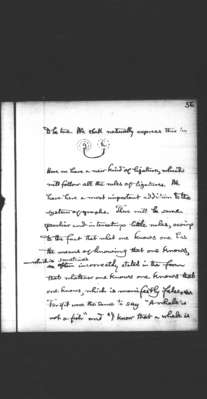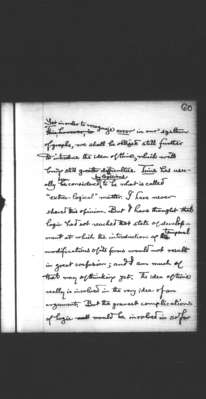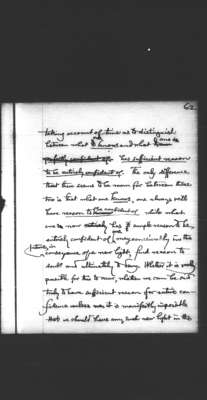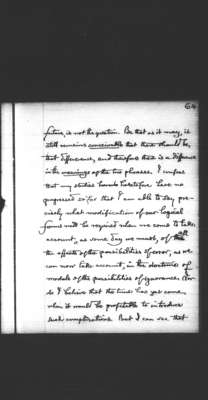Pages
66
56
to be true. We shall naturally express this by [diagram] Here we have a new kind of ligature, which will follow all the rules of ligatures. We have here a most important addition to the system of graphs. There will be some peculiar and interesting little rules, owing to the fact that what one knows one has the means of knowing that one knows, — which is sometimes incorrectly stated in the form that whatever one knows, one knows that one knows, which is manifestly false. For if it were the same to say “A whale is not a fish" and “I know that a whale is
67
58
not a fish,” the precise denials of the two would be the same. Yet one is “A whale is a fish” and the other is “I do not know that a whale is not a fish.”
The truth is that it is necessary to have a graph to signify that one state of information follows after another. If we scribe [diagram] to express that the state of information B follows after the state of information A, we shall have [diagram]
It is clear, however, that the matter must not be allowed to rest here. For it would be a strangely, and almost an ironically, imperfect kind of logic which should recognize only ignorance and should ignore error.
68
60
Yet in order to recognize error in our system of graphs, we shall be obliged still further to introduce the idea of time, which will bring still greater difficulties. Time has usually been considered by logicians to be what is called “extra-logical” matter. I have never shared this opinion. But I have thought that logic had not reached that state of development at which the introduction of temporal modifications of its forms would not result in great confusion; and I am much of that way of thinking yet. The idea of time really is involved in the very idea of an argument. But the gravest complications of logic would be involved in so far
69
62
taking account of time as to distinguish between what one knows and what one has sufficient reason to be entirely confident of. The only difference that there seems to be room for between these two, is that what one knows, one always will have reason to be confident of, while what one now entirely has ample reason to be entirely confident of, one may conceivably in the future, in consequence of a new light, find reason to doubt and ultimately to deny. Whether it is really possible for this to occur, whether we can be said truly to have sufficient reason for entire confidence unless it is manifestly impossible that we should have any such new light in the
70
64
future, is not the question. Be that as it may, it still remains conceivable that there should be that difference, and therefore there is a difference in the meanings of the two phrases. I confess that my studies heretofore have [not] progressed so far that I am able to say precisely what modification of our logical forms will be required when we come to take account, as some day we must, of all the effects of the possibilities of error, as we can now take account, in the doctrine of modals, of the possibilities of ignorance. Nor do I believe that the time has yet come when it would be profitable to introduce such complications. But I can see that




